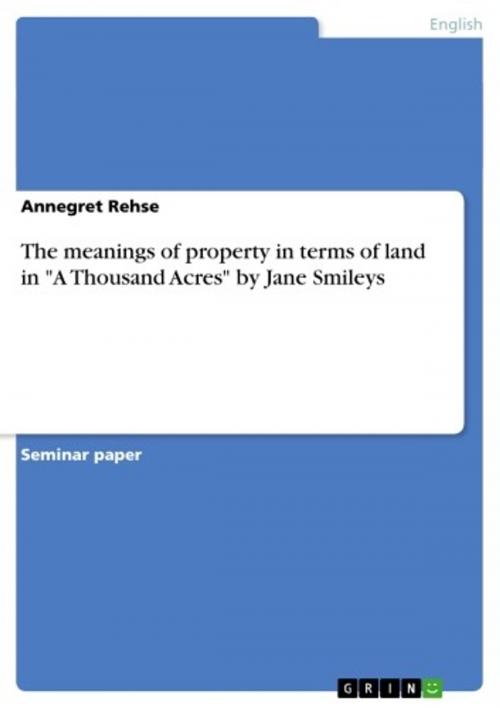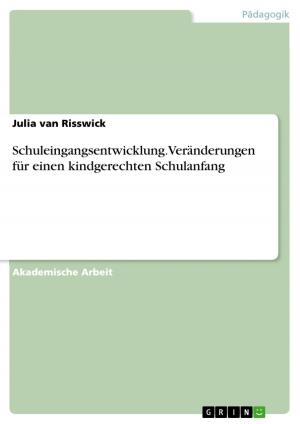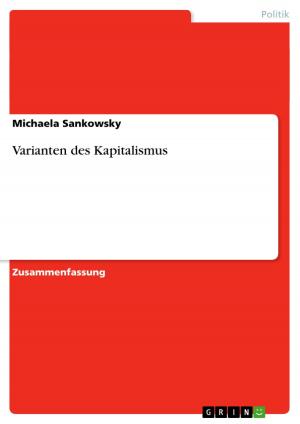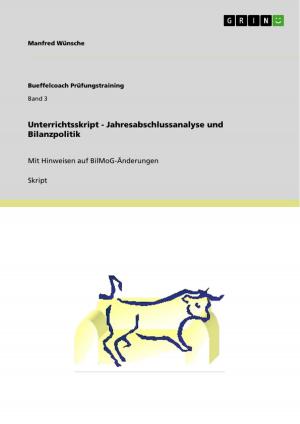The meanings of property in terms of land in 'A Thousand Acres' by Jane Smileys
Nonfiction, Entertainment, Drama, Anthologies| Author: | Annegret Rehse | ISBN: | 9783638008839 |
| Publisher: | GRIN Verlag | Publication: | February 22, 2008 |
| Imprint: | GRIN Verlag | Language: | English |
| Author: | Annegret Rehse |
| ISBN: | 9783638008839 |
| Publisher: | GRIN Verlag |
| Publication: | February 22, 2008 |
| Imprint: | GRIN Verlag |
| Language: | English |
Seminar paper from the year 2005 in the subject American Studies - Literature, grade: 2,0, Christian-Albrechts-University of Kiel (Englisches Seminar), 8 entries in the bibliography, language: English, abstract: This work deals with concepts of ownership in terms of land in the novel 'A Thousand Acres' written by Jane Smiley. The novel was written in 1991 and was rewarded a Pulitzer Prize. Jane Smiley rewrote the Shakespearean play King Lear by narrating the story from the eldest daughter's point of view. However, A Thousand Acres is not only a rewriting of Shakespeare's work, it also comments on the social and agricultural circumstances in the United States of the 1960s and 70s, where the novel is set. Her critique in this novel points towards industrialised farming and the exploitation of land and its resources. The aim of the paper ist to find out how agriculture and farming are represented in 'A Thousand Acres'. How does Jane Smiley describe the results of industrialised farming? Is there any return? How do people cope with agribusiness and its consequences? What is the structure of the society that lives for agribusiness? In the course of answering these questions I will try to draw relating problems between Smiley's 'A Thousand Acres' and Shakespeare's 'King Lear' and will try to point out the differences between the novel and the play in matters pertaining to concepts of land-ownership.
Seminar paper from the year 2005 in the subject American Studies - Literature, grade: 2,0, Christian-Albrechts-University of Kiel (Englisches Seminar), 8 entries in the bibliography, language: English, abstract: This work deals with concepts of ownership in terms of land in the novel 'A Thousand Acres' written by Jane Smiley. The novel was written in 1991 and was rewarded a Pulitzer Prize. Jane Smiley rewrote the Shakespearean play King Lear by narrating the story from the eldest daughter's point of view. However, A Thousand Acres is not only a rewriting of Shakespeare's work, it also comments on the social and agricultural circumstances in the United States of the 1960s and 70s, where the novel is set. Her critique in this novel points towards industrialised farming and the exploitation of land and its resources. The aim of the paper ist to find out how agriculture and farming are represented in 'A Thousand Acres'. How does Jane Smiley describe the results of industrialised farming? Is there any return? How do people cope with agribusiness and its consequences? What is the structure of the society that lives for agribusiness? In the course of answering these questions I will try to draw relating problems between Smiley's 'A Thousand Acres' and Shakespeare's 'King Lear' and will try to point out the differences between the novel and the play in matters pertaining to concepts of land-ownership.















